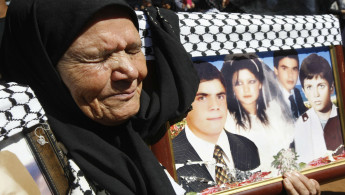Sabra and Shatila: Impunity and the things to come
Even though 33 years have passed since, one can still catch the scent of blood and glimpse the mutiliated bodies of the victims in the testimonies of the survivors.
The Sabra and Shatila massacre was a precedent in many ways. It would later prove to have been a prelude to subsequent atrocities, such as those unfolding in Syria today.
Most accounts of the massacre agree that Israel was directly responsible for the atrocity against Palestinian refugees, carried out using Lebanese proxies.
But the perpetrators of Sabra and Shatila have largely gone unpunished.
Justice not served
When former Israeli Prime Minister Ariel Sharon, who was the defence minister at the time, died in 2014, Human Rights Watch said in a statement: "It's a shame that Sharon has gone to his grave without facing justice for his role in Sabra and Shatilla and other abuses."
An Israeli commission of inquiry found that Sharon bore "personal responsibility" for the massacre and that he decided Phalangist militias "should be sent in" to the camps from September 16 to 18, despite the risk that they would massacre the civilian population there.
| In 2001, survivors brought a case in Belgium requesting that Sharon be prosecuted under Belgium's 'universal jurisdiction' law. |
The militias killed between 700 and 800 people, according to Israeli military intelligence estimates; other estimates were as high as 3,500.
The dead included infants, children, pregnant women, and the elderly, some of whose bodies were found to have been mutilated.
In February 1983, the Kahan Commission, Israel's official commission of inquiry investigating the events, found that Sharon's "disregard of the danger of a massacre" was "impossible to justify", and recommended his dismissal as defense minister.
However, Sharon remained in the Israeli cabinet as a minister without portfolio and later became prime minister in 2001, serving until suffering a stroke in January 2006.
Israeli justice authorities never conducted a criminal investigation to determine whether Sharon or other Israeli military officials bore criminal responsibility.
In 2001, survivors brought a case in Belgium requesting that Sharon be prosecuted under Belgium's "universal jurisdiction" law.
Political pressure led Belgium's parliament to amend the law in April 2003, and to repeal it altogether in August, leading Belgium's highest court to drop the case against Sharon that September.
Observers of the case will remember the 2002 assassination of former Lebanese MP and minister Elie Hobeika in Beirut. Hobeika was one the commanders of the Phalangist militias accused of carrying out the massacre in coordination with Israeli forces, and was willing to testify in front of the Belgian courts.
The assassination of Hobeika ended the possibility of revealing the perpetrators and those responsible for the massacre in court.
There are many reasons to bring the Sabra and Shatila case to international courts, as it was a massacre against refugees protected by international law, committed under the eyes of an occupying army in an occupied country that had undergone a lengthy civil war, in addition to it fitting the description of ethnic cleansing.
But none of these reasons were enough for the perpetrators to be referred to international justice; another episode of Israel evading punishment for its crimes.
The cycle of impunity
Evading punishment has become a principle used by all criminals in the region, from armies to regimes and militias, and has turned into the age where Arabs kill each other in the service of the Israeli project.
The crime was repeated in Syria in 1983 and in Iraq in 1990 onwards - only to reach what we hope is its apex in the ongoing massacre of the Syrian people at the hands of Assad's regime.
| The Sabra and Shatila massacre remains a testament to the international community's dereliction of duty |
The Egyptian regime also used the regional culture of impunity to commit massacres against its opponents following Abdel Fattah al-Sisi's 2013 coup.
The Sabra and Shatila massacre remains a testament to the international community's dereliction of duty in holding criminals accountable in the Middle East.
Israel's evasion of justice for the forced displacement of Palestinians from their land and replacing them with colonial settlers paved the way for the forced displacement of Syrians that we currently witness.
Syria today is not only suffering a refugee crisis, but the forced displacement and population transfer of a large number of victims of the Assad regime.
Those responsible for this crime even attempted to utilise it as a bargaining chip to end last month's battle of Zabadani, west of Damascus, while seizing land and property with the aim to settle certain sects in the place of the original residents.
Meanwhile, the international community watches the unfolding events and "expresses concerns". It sends aid through humanitarian organisations and, with time, the main concern becomes to secure funding for the aid to continue.
Millions become displaced from their land and "developed countries" admit tens of thousands as cheap labour, and soon the laws and conventions in place to protect refugees will be repealed or changed.
The situation has turned into a dark comedy when British Prime Minister David Cameron announced that "Great Britain" would admit 1,500 Syrian refugees from Lebanon as part of a wider package.
Thus, a crime that requires the punishment of the perpetrators turns into numerous side issues in which Arabs receive the world's charity.
A serious and transparent investigation into the Sabra and Shatila massacre has become a pressing need as a starting point to establish a modicum of justice in the Middle East and stop the cycle of violence that is based on impunity.



